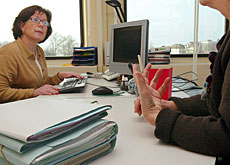Jobless total falls to lowest in five years

The number of people out of work in Switzerland has fallen below 100,000 for the first time in five years.
The jobless rate has now dropped to 2.5 per cent from 3.1 per cent at the start of the year, but some experts say the situation is not as rosy as the figures suggest.
On Friday the Swiss economics ministry announced the “heartening” news that the number of people out of work fell to 99,781 at the end of June, boosted by job creation across all sectors of the economy.
“A sharp rise in employment and a drop in joblessness have been observed in all sectors, professions, regions and age groups,” said Serge Gaillard, head of the labour division at the State Secretariat for Economic Affairs (Seco).
Seco said it was especially cheered by the number of young people finding work. The jobless figure for 15- to 24-year-olds has dipped by a quarter over the past year.
“Young people suffer the most during hard times of weak recruitment. On the other hand, firms take on more young people during periods of strong growth,” Gaillard explained.
Seco expects the jobless figure to stagnate next month as school leavers and graduates hit the market, but last month it revised down its forecasts, predicting an unemployment rate of 2.4 per cent for 2008.
Numbers game
But the economics ministry’s upbeat assessment is not shared by all. Yves Flückiger, professor of economics at Geneva University, says there is a tendency in Switzerland “to play with the definition of a jobless person, as there is in numerous other countries”.
Flückiger, who runs the university’s Employment Observatory, claims it is not the jobless rate but the number of jobseekers that gives a more accurate picture of the health of the employment market.
He says the jobseeker figure includes those who are retraining or on courses, and are therefore not available immediately for work. In June the number of jobseekers stood at 158,700 – almost 60,000 more than the jobless total.
In addition, during the course of last year 31,000 unemployed exhausted their right to claim benefit, with most of them falling off Seco charts.
A recent study conducted by the commune of Villars-sur-Glâne outside Fribourg found that a third of those who stopped claiming unemployment benefit had not found jobs.
“It needs to be noted that those who are not included in the Seco statistics are the most disadvantaged: women without training, foreigners who don’t speak the language, and young people without work experience. Often they cannot even claim benefits,” said Annelise Meyer-Glauser, the commune’s head of social services.
Jobseekers
Meyer-Glauser says the Swiss Labour Force Survey, published every year by the Federal Statistics Office, gives a more realistic view of the situation.
The survey, which is based on responses from 50,000 people, produced an average jobless rate of 4.0 per cent for 2006, whereas the figure given by Seco was 3.3 per cent.
“The Seco figures are very useful for following economic developments, but if one wants to have structural information, notably on all those seeking work, then the survey is more appropriate,” said Thierry Murier, a researcher at the Federal Statistics Office.
All the more so as the survey, which is conducted according to European standards, allows international comparisons.
In terms of the jobless rate during the second quarter of 2006, Switzerland (4.0 per cent) came behind Norway (3.5 per cent) and Denmark (3.7 per cent), but ahead of Italy (7.6 per cent), France (8.3 per cent) and Germany (8.5 per cent).
swissinfo
During the economic recession of the 1990s, the number of jobless rose dramatically in Switzerland, reaching 5.7% in February 1997.
A gradual upturn in the economy at the end of the 1990s caused the unemployment rate to fall to 1.7% in 2001. Since then it has fluctuated, reaching 3.3% last year.
Unemployment rates vary according to region: the French- and Italian-speaking areas have higher rates than the German-speaking ones.

In compliance with the JTI standards
More: SWI swissinfo.ch certified by the Journalism Trust Initiative











You can find an overview of ongoing debates with our journalists here . Please join us!
If you want to start a conversation about a topic raised in this article or want to report factual errors, email us at english@swissinfo.ch.